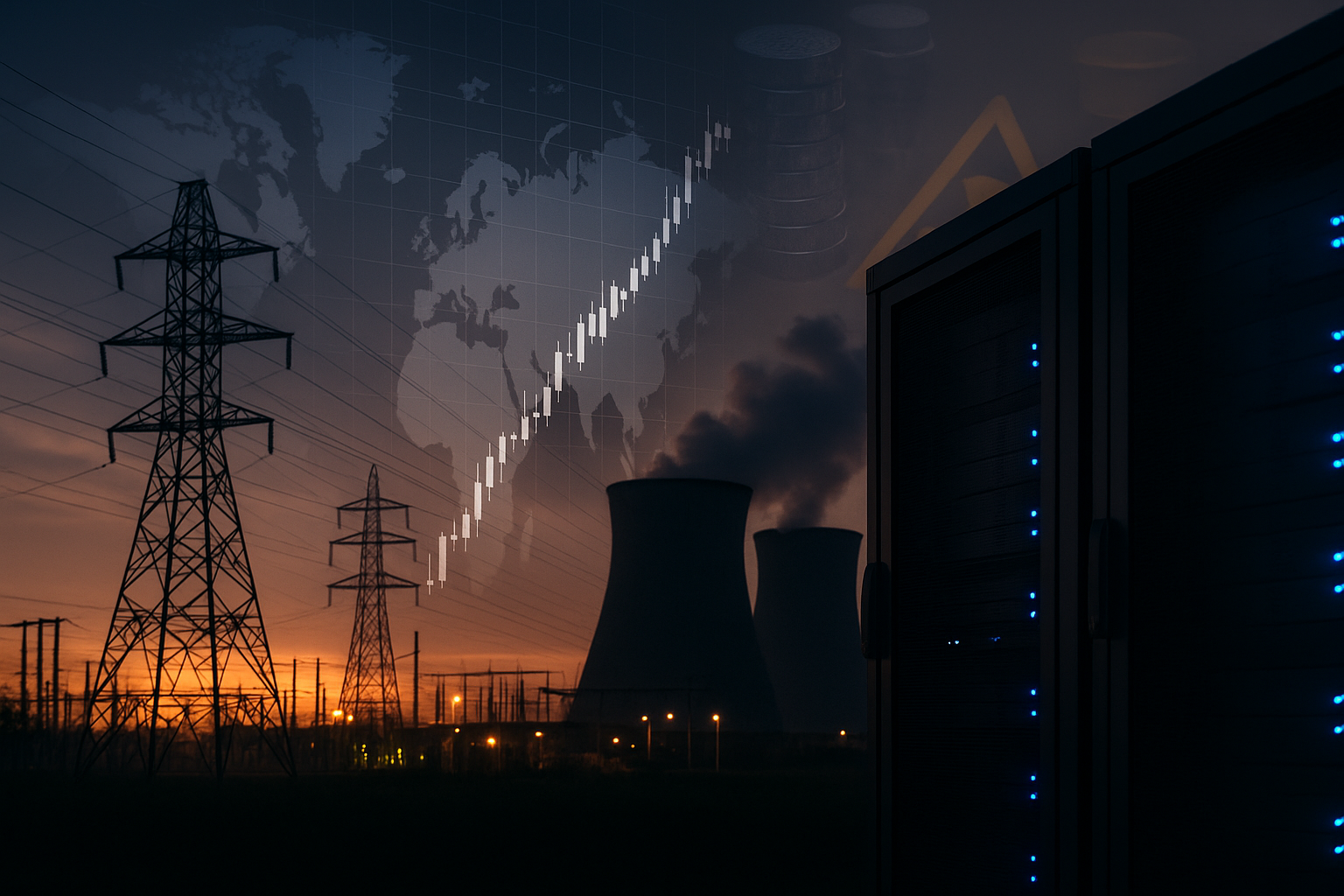AI Data Centers Ignite Uranium Surge as Urenco, Centrus, Orano Race to Replace Russian Supply
By Tredu.com • 10/6/2025
Tredu

The AI-Uranium Convergence: A Supply Chain Shock
The once-distant world of nuclear enrichment is now entangled with the frantic AI data center uranium demand race. Giants like Urenco, Centrus, and Orano are accelerating moves to supplant Russian-supplied enriched uranium—a pivot catalyzed by surging compute needs in artificial intelligence. The AI data center uranium demand story is now breaking into energy, defense, tech, and geopolitical headlines.
Why Uranium Matters to AI
Compute Needs vs. Energy Scale
Large-scale AI training and inference operations consume vast power. As data centers scale beyond conventional grids, nuclear’s high-density, stable baseload power becomes ever more attractive. That is driving convergence: AI operations need stable electricity, and enriched uranium is central to nuclear fuel.
In parallel, Western nations are restricting dependence on Russian supply of enriched uranium, creating a supply shock. The enriched uranium supply chain now faces capacity scarcity.
Russia’s Declining Role, and the Urgency to Replace It
Historically, Russia’s state-owned Rosatom supplied ~40 %+ of global uranium enrichment capacity. Western sanctions, bans, and import restrictions are constricting its role. In response: Urenco, Centrus, and Orano are stepping up to fill the gap, an urgent industrial scramble to rebuild autonomy over the nuclear fuel cycle.
Key Players: Urenco, Centrus & Orano in Action
Urenco (UK / European Consortium with U.S. Operations)
Urenco recently received U.S. regulatory approval to enrich uranium up to 10 % fissile concentration, from the current 5 % threshold. This higher-level enrichment (called LEU+) can improve reactor efficiency and reduce refueling intervals.
That regulatory shift positions Urenco to produce fuel that can serve both traditional nuclear reactors and next-gen reactors, and potentially support AI-powering nuclear plants. The company’s pivot is central to Western ambitions to displace Russian supply.
Centrus Energy
Centrus, a U.S.-based firm, has been developing high-assay low enriched uranium (HALEU) capabilities, fuel suited for advanced reactors and potentially for AI-charged nuclear plants. While not yet producing at full scale, Centrus is seen as a strategic lever in America’s future nuclear fuel stack.
Orano (France / Global Nuclear Firm)
Orano is expanding its footprint. It has been exploring U.S. operations and selecting sites to build new enrichment plants to serve the Western market. Its move aims to ensure that enriched uranium for nuclear reactors, and potentially AI-powered power plants, is under secure, non-Russian control.
In sum, Orano is aligning with the broader trend of replace Russian uranium with alternative Western sources.
Market Dynamics & Price Shock
Enriched Uranium Prices Soar
Prices for enriched uranium (measured in separative work units, SWU) have surged. Reports suggest prices have jumped from ~$56/SWU to near $190/SWU in some cases, driven in part by constrained supply from Russia and rising demand from tech-scale energy projects.
That dramatic rise imposes risk on nuclear power operators, but also accelerates investment in new capacity in the West, making projects that once seemed marginal now viable.
Supply Constraints & Capacity Gaps
Building enrichment facilities and scaling capacity is capital- and time-intensive. The Western world does not have spare enrichment capacity to absorb sudden demand.** The gap between short-term demand and longer-term build-out is acute, especially as AI data center operators weigh energy security risks.
Geopolitics & Industrial Policy
Governments are responding. U.S. legislation to ban Russian enriched uranium imports (with transition waivers until 2028) has unlocked $2.7 billion in support for domestic enrichment projects.
The confluence of industrial policy, national security, and commercial demand is driving capital flows into Urenco, Centrus, and Orano’s expansion efforts.
Risks, Bottlenecks & Strategic Wildcards
Lead Time & Regulatory Hurdles
New enrichment plants take years to design, license, and bring online. Regulatory oversight (safety, non-proliferation) adds complexity. The delay between contract demand and delivery is a major risk.
Uranium Feedstock & Conversion
Raw uranium mining and conversion (to uranium hexafluoride, UF₆) are separate steps. Enrichment capacity is only one part of the chain. Bottlenecks can appear upstream, limiting what new enrichment capacity can consume.
Demand Volatility from AI & Energy Shifts
If AI compute architectures evolve (e.g., better power efficiency, alternative energy sources), demand for nuclear-supplied baseload might shift. That introduces demand uncertainty for enrichment firms.
Strategic Implications & What to Watch
- Long-term contracts become crucial
AI operators and utilities may lock in 10–20 year enrichment deals to ante into new capacity, much as cloud firms pre-pay power. - West vs. East bifurcation
The uranium market could fracture: one supply network anchored in Russia/China; another anchored in U.S./Europe via Urenco, Centrus, Orano. - Vertical integration
Some AI/data center operators may invest directly into nuclear or enrichment infrastructure, ensuring energy-to-compute alignment. - Policy acceleration
Expect further government incentives, streamlined regulation, and subsidy programs aimed at speeding enrichment capacity deployment in the West.
Ultimately, the AI data center uranium demand phenomenon is rewriting the nuclear fuel narrative. Urenco, Centrus, and Orano are now central actors in a race to replace Russian uranium as the backbone of enriched uranium supply. As AI scales, energy and compute supply chains converge, and the control of nuclear fuel could become as vital as control of silicon. The pivot from Russia to Western enrichment is no longer optional, it’s imperative.

How to Trade Like a Pro
Unlock the secrets of professional trading with our comprehensive guide. Discover proven strategies, risk management techniques, and market insights that will help you navigate the financial markets confidently and successfully.


